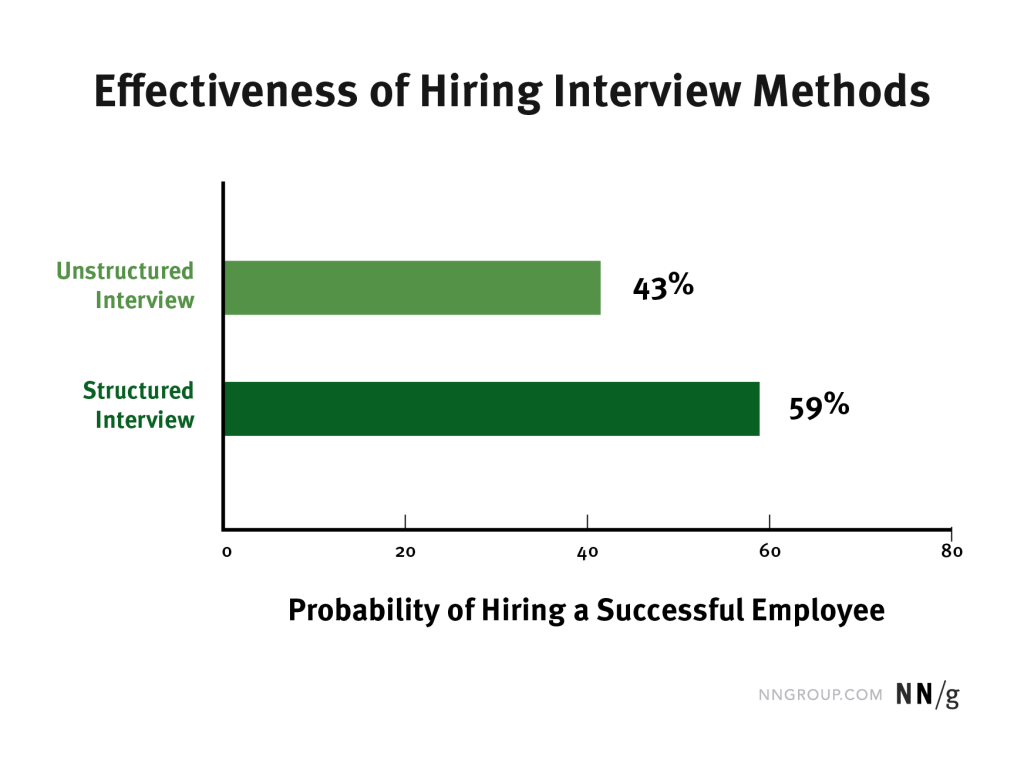During the interview, it’s all about making everyone feel as comfortable and prepared as possible. You’ve done the prospect’s initial assessment. It’s time to gauge how the job candidate might fit in with the rest of your organization.
Interviews are typically stressful for both sides. But you can bring out the best in everyone by preparing in advance, helping out both the candidate and interviewer, and approaching the interview as an opportunity to sell your company.
Read on to learn how a positive interview experience can help both your organization and candidates do better during interviews.

1
Choose the right interviewers
While each person performs differently in an interview, you can try to match the right interviewer to the occasion to improve the interview experience.
Ask yourself:

Create a spreadsheet of each interviewer on your team, with columns for their unique interests, skills, background, and interview style.
Try to identify a few interviewers for each stage of your interview process. This can help you keep your hiring timeline on track if your first-choice interviewer isn’t available when you need them.
2
Align around expectations
Everyone on your recruiting team should be on the same page. Prepare a script for your interviewers to ensure the questions they ask and the information they provide to candidates is aligned with your hiring needs and contributes to a positive candidate experience.
A “script” for your interviewer should make clear:
Although each team member may only play a small role in improving the candidate experience, having access to the whole interview survival guide helps them understand where they fit into the overall experience. It also lets them fulfill their role with more insight, reliability, and specificity.
This planning leads to a well-structured interview experience, which research shows correlates with better hiring outcomes.

Source: Research by Sackett, Zhang, Berry, and Lievens, via Nielsen Norman Group
The scripts should also contain specific interview templates that include:
A structured interview experience is a crucial part of signaling to the candidates that your company is a well-oiled machine where they have the space and support to do the best work of their lives.
3
Minimize stress
Nearly everyone in a job interview is going to be stressed out. That includes the 93% of candidates who report being nervous for an interview, but also your hiring managers, who want to ask the right questions and make the right hiring decision.
An important way to improve the candidate experience is to help both parties relax and put their best foot forward in the interview.
In the simplest terms, your job as a recruiter is to make sure interviews go well.
Unless the role you’re hiring for really needs someone to be highly creative under a ton of stress, there’s no reason you need to test for that in the interview.
Give everyone involved the information they need to feel confident and prepared.
93%
of candidates report being nervous for an interview
64%
of candidates research their interviewer
Provide candidates with the:
Provide interviewers with the:
Don’t underestimate the importance of sending detailed interview confirmation emails to your candidates and a comprehensive calendar invitation to your interviewers. Aiding interview preparation is the best way to minimize stress and enable each person to put their best foot forward.
4
Rehearse interviews
Very few companies actually rehearse or evaluate what happens in interviews—but that’s a mistake. An interview rehearsal can help less practiced interviewers relax, prepare, and identify areas for improvement.
In addition to familiarizing interviewers with the questions they’ll ask, help them work on their body language, voice, word choice, and etiquette. Each of these play a key role in providing a positive candidate experience.
During rehearsals, you can also shine a spotlight on what your best interviewers do well. Share recorded virtual interviews to highlight the things your previous hiring teams have done to provide a smooth interview experience.
You can even help key hiring personnel by setting up mock interview scenarios. Like with any skill, not everyone will naturally excel in the role—and everyone can benefit from constructive feedback.

5
Take notes
Even if you’re certain your memory alone is enough to recall the important details after the interview, you should still take notes. Taking notes is a simple, free way to show the candidates you actively listen to them and want to learn about their experiences.
Jot down answers to your questions to easily remember your candidates’ off-page experiences and personality. Write follow-up questions as you think of them, so you don’t interrupt or forget to inquire.
Most interviewers today will default to taking notes on their laptops or even phones. Just be careful not to get distracted by emails, Slack messages, or anything else that would take your focus away from your candidate. If needed, use paper to take notes for in-person interviews or record virtual interviews to review them later.

6
Share next steps
At the end of the interview, tell the candidate what they can expect. There’s no reason to drag out their experience if you already know what will happen one way or another. You can build trust and reduce stress by sharing this.
You can also improve the candidate experience by letting candidates know when they’ll hear from you next. If you or your hiring manager is ready to move them forward, let them know that. Tell them when the next interview or project will most likely be and when they’ll hear from you.
If you need more time to consider, tell the candidate when they’ll have a response.
If you’re certain it’s not a fit, let the candidates know quickly. As painful as it can be to reject a candidate, it is often more painful for the candidate when you delay the news.

7
Sell first
The interview process is a two-way street. The best candidates will vet you just as much as you vet them. You can improve the candidate experience and hiring outcomes by assuming you have a top candidate before you, and it’s your job to win them over.
That means selling the company, job, work environment, and benefits before you start firing interview questions at them.
Instruct your interviewers to focus on selling first, and make this an explicit step in the interview templates you create. Find your strongest talking points from:
The interviewer doesn’t have to mention every single advantage of joining the company in one hard sell. Instead, write out questions interviewers can ask to determine what each candidate is most interested in and motivated by. Then, write out a snippet that sells the company and the opportunity. Record and practice this with your interviewers to help make it stick.
This shift in thinking can have a significant impact on your hiring. For instance, it takes some pressure off the candidates to help them feel more comfortable and perform better. It also reduces your chances of having a top candidate withdraw from the interview process too early.
Final thoughts on improving the interview experience
The interview stage is the first interactive stage of your candidate experience. Before the interview, you present information to candidates, and they do the same. You take turns learning about each other to determine if there’s a good fit.
In the interview, you see how this comes together in real-time. You want your interviewers prepared with a solid script to ask the right questions without wasting time.
You can prepare for this with practice runs and trying out different interviewers to see who connects best with your prospective candidates. Give feedback to help interviewers get better and remember to sell your company, not just confirm information you already know from candidates’ resumes.
You can improve the candidate experience with these small actionable steps.
JobScore understands how every hiring stage leads you to choose the right candidate. Start making better hiring decisions with its interview templates, rating criteria, and feedback dashboard today.

Subscribe for updates
Get talent acquisition best practices, trends, and news delivered directly to your inbox.
By entering your email, you agree to receive marketing emails from JobScore



